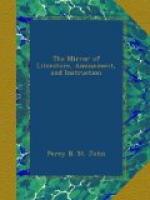Or, haply, to all eyes unknown,
Is borne away without a groan,
On a chance plank, ’mid joyful cries
Of birds that pierce the sunny skies
With seaward dash, or in calm bands
Parading o’er the silvery sands,
Or mid the lovely flush of shells,
Pausing to burnish crest or wing.
No fading footmark see that tells
Of that poor unremembered thing!
O dreadful is the world of dreams,
When all that world a chaos seems
Of thoughts so fixed before!
When heaven’s own face is tinged
with blood!
And friends cross o’er our solitude,
Now friends of our’s no more!
Or dearer to our hearts than ever.
Keep stretching forth, with vain endeavour,
Their pale and palsied hands,
To clasp us phantoms, as we go
Along the void like drifting snow.
To far-off nameless lands!
Yet all the while we know not why,
Nor where those dismal regions lie,
Half hoping that a curse to so deep
And wild can only be in sleep,
And that some overpowering scream
Will break the fetters of the dream,
And let us back to waking life,
Filled though it be with care and strife;
Since there at least the wretch can know
The meanings on the face of woe,
Assured that no mock shower is shed
Of tears upon the real dead,
Or that his bliss, indeed, is bliss,
When bending o’er the death-like
cheek
Of one who scarcely seems alive,
At every cold but breathing kiss.
He hears a saving angel speak—
‘Thy love will yet revive!’
[1] An artist of celebrity is now engaged on a portrait of Mr. Southey, cum privilegio, we suppose, Mr. Southey is not the only public man, whose lineaments have been traduced by engravers. Only look at some of the patriotic gentlemen who figure at public meetings, and in outline on cards, &c. But Houbraken is now known to have been no more honest than his successors in portrait engraving: although physiognomy and craniology ought to help the moderns out in these matters.
Then comes A Farewell to the year, one of Mr. Lockhart’s elegant translations from the Spanish; a pretty portrait of rustic simplicity—the Little Gleaner, by the editor; and some playful lines by M.A. Shee, accompanying an engraving from his own picture of the Lost Ear-Rings. The Wedding Wake, by George Darley, Esq. is an exquisite picture of saddened beauty. The Ettrick Shepherd has the Carle of Invertine—a powerful composition, and the Cameronian Preacher, a prose tale, of equal effect. In addition to the pieces already mentioned, by the editor, is one of extraordinary excellence—the Magic Bridle: his Lines to a Boy plucking Blackberries, are a very pleasing picture of innocence:—




